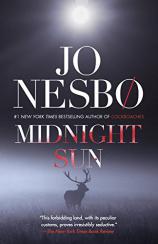Midnight Sun
Review
Midnight Sun
Author Jo Nesbø has been continuously at or near the tip of the spear of the Nordic Noir movement since his dark, gritty police procedural novels have been slowly but inexorably making their way out of his native Norway. Harry Hole, the damaged protagonist of those books, is not featured in MIDNIGHT SUN, Nesbø’s latest effort, but absent the fulfillment of that expectation, fans of his grim vision and gallows humor will find much to enjoy in this short novel that is set in a cold climate and gives free rein to colder emotions.
MIDNIGHT SUN is a sequel of sorts to BLOOD ON SNOW, which introduced a notorious Oslo drug lord known as the Fisherman. That less-than-worthy gent does not appear prominently here, other than in a flashback vignette that explains the events that propel what is occurring in the book’s real time. Rather, the reluctant protagonist is Jon Hansen, who, until very recently, had been a fixer for the Fisherman. As we quickly come to learn, it is a position that he earned under false pretenses, and his skill set, whatever it may be, has left him ill-suited for the work. Having failed his employer in every way possible, Hansen, using the name “Ulf,” has fled Oslo in fear of the Fisherman’s retribution. As the novel begins, he arrives in the tiny town of Kåsund in the godforsaken area of Finnmark, a far northeastern county of Norway where the indigenous people and a strict Christian sect uneasily co-exist.
"MIDNIGHT SUN may not be as long as some of Nesbø’s efforts featuring Harry Hole, but he plumbs his usual depths, utilizing a number of deceptively simple but ultimately complex characters with some oddball secondary players and mixing them with a menace that is omnipresent, whether on or off the page."
Ulf knows that he is being pursued by a minion of the Fisherman, but for reasons never fully articulated --- probably because he doesn’t know them himself --- he chooses to make his stand on what is essentially the edge of the world, awaiting a violent death that is all but certain. At least part of his reason for staying may well be his gradual awareness of his attraction to a woman named Lea, who is the daughter of the local minister, and her son Knut, who is a cheerful and charismatic pest. Lea and Knut resurrect feelings in Ulf that were long dead, but they arrive at the worst possible time in the worst of places. Ulf is an outsider among outsiders, and when the Fisherman’s representatives arrive in Kåsund looking for “Jon Hansen,” the town closes ranks. At least at first.
Ulf, of course, inadvertently offends one of them, an act that comes back to haunt him and Lea later. Lea has her own problems, some of which appear to be resolved and others that seem to be irresolvable. Ulf is so buried by mistakes and circumstances in his past that he seems to be little more than a lightweight pinball, one who bounces around on the whims of others. He is not entirely without guile, however, and when backed into a corner, he sometimes can rise to the occasion. The question that haunts Ulf and the reader is: Will Ulf come through? Can he?
MIDNIGHT SUN may not be as long as some of Nesbø’s efforts featuring Harry Hole, but he plumbs his usual depths, utilizing a number of deceptively simple but ultimately complex characters with some oddball secondary players and mixing them with a menace that is omnipresent, whether on or off the page. Those Nesbø aficionados who otherwise might be disappointed by Hole’s absence this time around will have no cause for negative feelings here, thanks to the author’s sharp combination of characters and plot and Neil Smith’s robust, journeyman translation.
Reviewed by Joe Hartlaub on February 19, 2016





